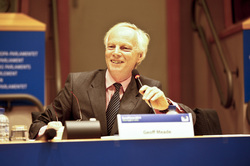I speak not of the new holder of the post, Jean-Claude Junker, but of the man who originally declared that Europe should do less and do it better, Jacques Santer.
Jacques, the second of the three Luxembourgers to hold the highest office, is now best remembered as the only Commission president forced to resign over allegations of sleaze and incompetence.
He hadn't been the most dynamic Commission President, but nor was he a crook, and his downfall can be blamed on one of his Commissioners, Edith Cresson, who gave well-paid Commission work to an old chum who clearly wasn't qualified. The old chum was her dentist and when the tooth came out (sorry) Santer's fate was sealed.
He and his team departed on the day a report into Commission malpractice declared that "It is difficult to find anyone who has even the slightest sense of responsibility".
But before the scandal of the dodgy dentist kicked him in the teeth (sorry), Jacques coined a catchphrase when he said that the Commission's aim in future would be "to do less, but do it better".
Scribes and thinkers pondered these few words and found them to be good, particularly the first bit. Because doing less is, in a very real sense, the least we can do.
Santer's slogan followed a hectic few years during which the EU had grown a few treaties, expanded to 15 countries, started EU membership entry talks with a dozen more and launched the euro. In other words, business as usual.
But his call for, at the very least, a bit of a break from so much doing, didn't really work. The affair of the dentist extracted (sorry) all credibility from Santer's regime; and after he was sentenced to serve time as an MEP, the Commission picked itself up and ploughed on doing more, and not necessarily doing it better.
To this day, the EU has not had much success in doing less.
The Union's component parts seem to need to keep busy: who wants to be a fonctionnaire with a reputation for doing less?
Commissioners need initiatives and policy proposals, MEPs need soap-boxes built and maintained, not to mention feathers for their caps and political scalps for their belts.
And the Council of Ministers needs an endless supply of councils for the ministers with all that that implies for doing much, much more.
Even standing still is not an option, never mind standing still better. There must always be something on the go: treaties and changes, and policy programmes, document launches and experts in groupings, big consultations all tied up in string, these are a few of my fav......sorry I'm getting carried away now.
Where were we? Yes, added to the above is the ever-present urge for even more EU expansion, despite plenty of evidence that doing less and doing it better would be a very useful skill in that particular department. Commendably, Jean-Claude Juncker has at least ruled out any new members in the EU club for the next five years, on the grounds that we've got more than enough on our hands.
The EU did slow down, briefly, once. There was an official "pause for reflection" after a constitutional treaty collapsed, but that only resulted in a determination to go at it again with even more gusto.
Mr Juncker's predecessor as president, Jose Manuel Barroso then started speaking of "more Europe", although, to fend off critics, his people argued that more can actually be less, in the same way that less is often said to be more.
More or less.
But what Jean-Claude Juncker said recently is somewhere in between. He promised to work for "an EU that is bigger and more ambitious on big things; and smaller and more modest on small things".
That is decidedly ambiguous, and you don't have to be an expert to realise that there is too much going on, everywhere, all the time.
With some notable exceptions, institutions, governments and people are doing more and doing it worse.
So doing less would be good, and let us salute Jacques Santer and live our own lives by his unfulfilled creed.
I myself have been doing less for some considerable time, and I am now on the brink of trying to do it better.
But I'm taking it one step at a time.


 RSS Feed
RSS Feed